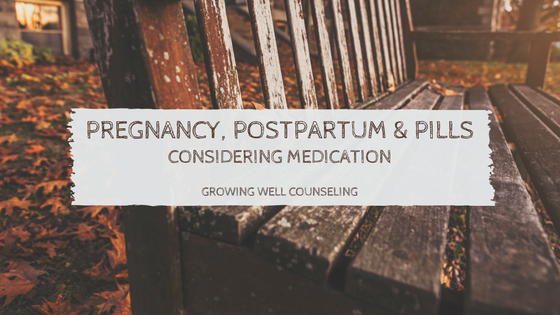To medicate or not?
That is the question and there is no one right answer. I cannot begin to count the number of times I heard the response, “Well, it depends.” in graduate school. As an aspiring counselor little did I know how much the uncertainty of counseling life would mirror motherhood. While I sighed countless times back then just wishing there were a definite answer to my question, I now have to pass along that vague unknown to clients at times. Many mothers ask me,
“Should I take medication?”
“Is it safe?”
“Will it hurt my baby?”
And sometimes the opposite occurs, a woman knows she needs medication and because she is pregnant or breastfeeding she is given fear rather than facts, misinformation rather than medical care. Clients tell me their medical providers refuse to prescribe, will only prescribe in a certain trimester of pregnancy or bargain with clients requiring they promise not to breastfeed. Some prescribers mistakenly offer a woman a sub-optimal dose thinking that less is better however then we are faced with exposure without relief of symptoms. Women are forced into a dark, lonely corner with nowhere to turn and no clear information. I must ask, how does this help anyone? Mom, baby, or the family unit?
Let me be clear, there are risks and benefits to any medical intervention. I am not going to blindly say that there is no risk in consuming medication while pregnant or breastfeeding. I consider my practice orientation to be holistically minded and am a crunchy mom myself, however we must ask ourselves
What are the risks to mom and baby [and the family as a whole] if mom is unwell?
What are the risks to baby if mom cannot get out of bed to respond to cries, or cannot eat enough to make milk?
What if mom isn’t sleeping, or is paralyzed in her anxiety and can’t get the baby to pediatrician visits? Or get herself medical care? What if she cannot work because her symptoms are so severe?
Women, their doctors, their therapists and their supports all need evidence-based research and an honest conversation about risks AND benefits to make an informed decision. No one deserves to suffer in silence, and no one deserves to be backed into a corner to make a tough decision alone.
Some questions I ask my clients include
-Have you had anxiety or depression severe enough to warrant medication in the past? Is it likely that is necessary at this time in your life, too?
-Have you had recent comprehensive blood work? At minimum, a full thyroid panel, iron, vitamins B & D? Even if you’ve had previous diagnoses related to your thyroid, pregnancy and postpartum can shift what you need to keep your thyroid supported and individuals with no history may be surprised to learn they have a new imbalance.
*Keep in mind that if you’re still nursing, your body prioritizes your baby, high quality multi-vitamins are a great start, and consulting with a naturopathic doctor or your trusted medical professional can offer additional recommendations for your unique needs
-Have you talked to a holistic provider?
-Are you staying hydrated and getting as much rest as you can? Do you have supports to give you breaks ?
-What are the risks to you AND your baby of NOT-treating your mood symptoms?
Ideally a pregnant or postpartum mom will have the expertise and support of a team of informed providers including a psychiatrist or psychiatric nurse practitioner with training in perinatal mood issues, who understands risk/benefit assessment of medications and has experience prescribing to expectant and nursing women. This prescriber can collaborate with a client’s therapist to monitor weekly progress and the prenatal provider (OBGYN or midwife) to monitor pregnancy progress.
Whatever mom decides should be what helps her and her baby achieve wellness sooner rather than later- stable mood, restful restorative sleep, reasonable appetite, and ability to not only complete daily tasks but find enjoyment as well are my goals for women experiencing perinatal emotional distress. Studies show that cognitive-behavioral therapy in conjunction with medication is most effective against depression, so don’t quit counseling as soon as you have prescription, utilize all resources [medical doctor or midwife, prescriber and therapist] to help you get well. You are worth it. It does get better.
Disclaimer: This post is informational and nature and not a substitute for psychotherapy.

